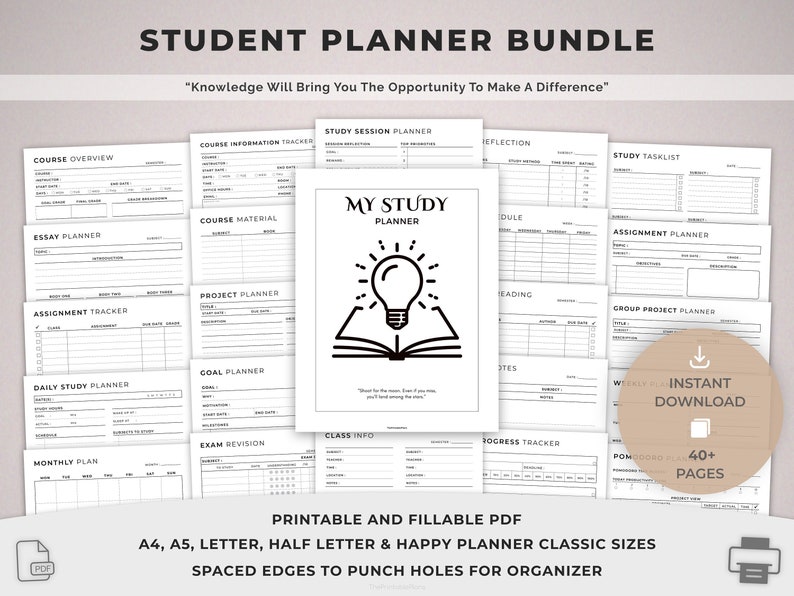Feeling overwhelmed by exams? This ultimate guide equips you with effective study tips and strategies that will help you tackle your college journey easily.
College is not an easy journey to deal with. But don’t worry; college can be hard and stressful for a lot of students. This guide is packed with effective study tips and strategies to not only face your courses with a positive mindset but also to deal with stress and anxiety and stay motivated, all while excelling in exams, managing your time for both social and academic life, and maintaining your physical and mental health. Let’s explore some effective study tips that will help you conquer college life.
Exploring Effective Study Tips for College Students
Feeling overwhelmed by exams? Don’t worry, and it happens to everyone. Let’s dive deep into some effective study tips and strategies appropriately to prepare and alleviate pressure, allowing you to excel academically.
1. Planning and Organization
Planning and organization are key to conquering your studies without stress. Creating a study schedule is the foundation for a successful semester. Here are some effective study tips on planning and organizing.
Consistency is Key
Plan out dedicated study periods throughout the week, even if they are brief. Consistent review boosts retention and comprehension compared to last-minute cramming.
Tools and Techniques
- Planners or calendars: For every class, allocate fixed times. This includes lectures, study sessions, and assignment deadlines.
- Time management apps: Utilize apps to set reminders and track progress.
- The Pomodoro Technique: Divide study time into concentrated 25-minute segments, taking small breaks in between to stay attentive.
Balancing Study and Leisure
- Identify priorities: Distinguish between urgent and important tasks. Give importance to necessary studying for deadlines in the near future, and plan leisure activities for specific relaxation times.
- Estimate time commitments: Think realistically about how much time every task will take (study, assignment, socialize) to avoid filling up your schedule too much and feeling stressed out.
- Include “me” time: Make sure to include breaks, hobbies, and social activities in your schedule so you don’t burn out.
2. Active Learning Strategies
Passive rereading lulls you into a false sense of security. Active learning engages your brain and strengthens memory. Here are some effective study tips on how to actively learn.
Engagement Over Passive Reading
- Previewing: Before diving in, skim the material to grasp the main ideas and identify key terms.
- Questioning: Ask yourself questions as you read: What are the main points? How does this connect to what I already know? What are potential exam questions?
- Summarizing: After each section, paraphrase the information in your own words. This helps solidify understanding and identify areas needing further review.
Flashcards and Quizzes
- Flashcards
Concept flashcards: On one side, write a concept; on the other, elaborate with an explanation, diagram, or example.
Practice retrieval: Don’t just peek at the answer! Write it down first, then check. This strengthens recall.
- Quizzes
Self-quizzing: Create practice questions based on your notes, textbook chapters, or potential exam topics.
Online quizzes: Many learning platforms offer practice quizzes to test your knowledge.
Group Study
Benefits of Group Study
- Multiple perspectives: Group discussions offer different viewpoints to solidify understanding.
- Collaborative learning: Explaining concepts to others strengthens your own knowledge.
- Motivation and accountability: Studying with others can keep you focused and on track.
Finding Compatible Members
- Classmates: Look for classmates in your courses who share similar learning styles and goals.
- Subject-specific study groups: Many colleges offer or facilitate subject-specific groups where you can find peers in your classes.
- Online platforms: Utilize online platforms designed to connect students for study groups.
3. Ways to Maximize Learning
Find Your Optimal Study Environment
The ideal study environment is different from person to person. Experiment to discover what works best for you.
Quiet vs. Background Noise
- Quiet environments: Libraries or private study rooms are ideal for focused reading, memorization, and complex problem-solving.
- Background noise: Some students think that a little bit of background noise, such as what you might hear in a coffee shop, helps them concentrate.
Organized Space
- Minimize distractions. Declutter your study area and remove unnecessary electronics.
- Ensure proper lighting and comfortable seating for extended study sessions.
Take Effective Notes
Strong note-taking skills are crucial for retaining information. Here are some effective study tips on taking notes.
Note-Taking Methods
- Cornell Method: Split your page into three parts: cues (main items and keywords), notes (details and explanations), and summary (important points noted after revising).
- Mind Mapping: Make a graphical representation of a topic by taking the main concept, creating branches for subtopics, and linking details with lines or arrows
- Outlining: Organize information in a hierarchical structure with main points, sub-points, and supporting details.
- Bullet Journaling: Use a bullet point format with icons, symbols, and quick sketches for a flexible and customizable approach.
Reviewing and Revising
- Revisit your notes within 24 hours to solidify concepts in your memory.
- Summarize key points and condense lengthy notes for easier review.
- Identify gaps in understanding and revisit those sections in your textbook or seek clarification from your professor.
Digital vs. Handwritten Notes
- Digital notes: Offer portability, easy organization, and searchability. Tools like tablets or laptops can be helpful for capturing large amounts of information quickly.
- Handwritten notes: Enhance active learning and memory retention through the physical act of writing.
- Choosing Between Digital and Handwritten: Consider your learning style and preferences. Some students find a combination works best, using digital notes for lectures and handwritten notes for active review and summarization.
4. Prioritize and Manage Your Time
Learn to Prioritize Your Tasks
Time management hinges on prioritizing tasks. Here are some effective study tips to help you decide how to prioritize your tasks and which tasks to tackle first.
The Eisenhower Matrix
Categorize tasks based on urgency (needs immediate attention) and importance (contributes to your long-term goals).
- Focus on urgent and important tasks (Do First): Assignments due tomorrow, studying for an upcoming exam.
- Schedule important but not urgent tasks (Schedule): Advance planning for research papers and such long-term project work.
- Delegate or eliminate less urgent, less important tasks (Delegate/Eliminate): Repetitive tasks a classmate can handle, attending an optional social event that conflicts with studying.
SMART Goals
- S = Specific: State clear and precise goals. Instead of saying, “Study biology,” you can say, “Review chapters 5 and 6 for the upcoming quiz.”
- M = Measurable: Set clear, achievable targets. “Dedicate 2 hours to studying for the history exam on Friday.”
- A = Achievable: Set realistic goals that challenge you but can be accomplished within your time limits.
- T = Time-bound: Set deadlines to maintain focus and hold yourself accountable.
Avoiding Procrastination
Procrastination is a common foe for college students. Here are some effective study tips to combat it.
- Identify your triggers: What situations or emotions lead you to procrastinate? Being overwhelmed, social media distractions, etc.
- Break down large tasks: Feeling intimidated by a big project? Divide it into smaller, more manageable steps.
- Reward yourself: Set achievable milestones and celebrate completing them with small rewards to stay motivated.
- Use a timer: Set a timer for focused work sessions (like the Pomodoro Technique) to avoid getting bogged down.
- Eliminate distractions: Silence your phone notifications, close unnecessary browser tabs, and find a quiet study space to minimize interruptions.
5. Maintain Focus and Well-being
A healthy body and mind are essential for academic achievement. Here are some effective study tips to stay focused and energized throughout the semester.
Stay Healthy and Nourish Yourself for Optimal Performance
Nutrition and Hydration
- Balanced diet: Consume a balanced diet that has various food groups, including fruits, vegetables, whole grains, and lean protein, to maintain energy throughout the day.
- Cut down on sugar and processed food: These may cause energy slumps and make it harder to focus.
- Stay hydrated: Drink a lot of water throughout the day to maintain cognitive function and alertness. Aim for eight cups of water each day, adjusting according to how active you are and the weather.
Exercise
- Regular physical activity: Just doing light exercise like walking at a fast pace, jogging, or cycling for around 30 minutes on most days can greatly enhance your ability to concentrate, remember things, and feel better.
- Breaks for movement: Stand up and stretch every 30 to 60 minutes. This will prevent stiffness, enhance blood flow, and give your brain a break.
Sleep
- Prioritize sleep: Get 7-8 hours of good sleep each night. Sleeping enough is very important for memory strengthening, information processing, and overall cognitive function.
- Develop a consistent sleep schedule: Make an effort to sleep and rise at consistent hours every day, including weekends. This can help in managing your body’s internal clock for better sleep quality.
- Create a relaxing bedtime routine: Try to relax before bed with calming activities like reading, taking a warm bath, or light stretching to promote better sleep quality.
6. Use College Resources to Empower Your Academic Success
College campuses provide you with many resources to support your academic journey. Don’t hesitate to take advantage of these valuable tools.
Tutoring Services
Colleges often have free or inexpensive tutoring services. Tutors are available to give personal help with particular subjects, respond to queries, and explain difficult ideas.
Libraries and Online Databases
Libraries in colleges are like gold mines for knowledge. Librarians possess great skills in research and can assist you in locating appropriate academic journals, articles, and books related to your tasks. Numerous libraries provide areas for quiet study, computer laboratories, along printing services.
Workshops and Seminars
Time management, study skills, and writing abilities can be enhanced through workshops and seminars held by colleges. These activities provide useful methods for achieving success in your studies.
7. Manage Stress and Stay Motivated
College life can sometimes feel overwhelming, causing stress and moments of low motivation. To help you handle this, here are some effective study tips that will not only enhance your learning but also keep a positive perspective.
Mindfulness and Meditation
If you practice things like deep breathing or meditation, it can assist you in handling stress in the moment. These methods encourage relaxation, enhance concentration, and aid emotional control. Numerous apps for guided meditation and resources online can be helpful to begin with.
Time Management
Manage your time well to minimize stress. When you make a plan for your schedule, give importance to different tasks, and don’t delay in doing them, it helps you feel more organized and less stressed.
Seeking Help
Don’t be afraid to ask for help. Most colleges give a range of resources to support student well-being.
- Counseling centers: College counselors can provide confidential support for things like stress, anxiety, or other mental health issues. The counselors can also offer guidance on developing coping mechanisms and managing academic pressure and stress.
- Academic advisors: Your academic advisor can guide you to navigate your academic path, select courses, and ensure you’re on track to graduate. They can also provide emotional support and motivation.
Conclusion
College is a journey of growth and discovery. These effective study tips are the tools you need to navigate challenges, maximize your learning potential, and achieve academic excellence. Visualize yourself confidently presenting in class, delivering a well-structured essay, or acing that upcoming exam. Remember, you are capable, and you have the power to succeed. Use these effective study tips and strategies and conquer your courses with confidence.














